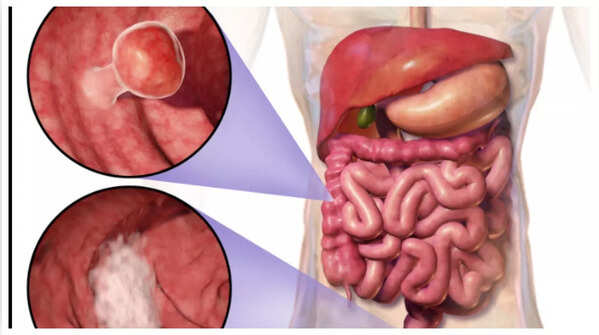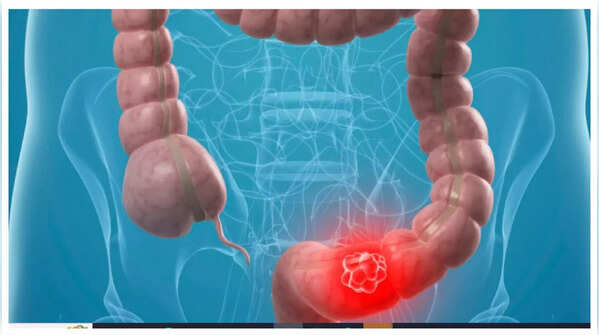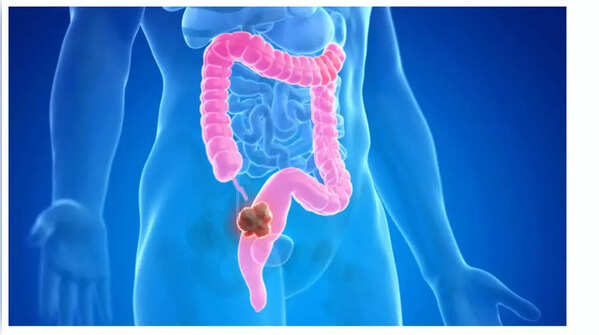Colon cancer, also known as colorectal cancer, originates in the colon or rectum. It often begins as noncancerous polyps, which can become cancerous over time. While most cases occur randomly, factors like family history, obesity, and lifestyle can elevate the risk, particularly after age 50. Early symptoms are often subtle and mistaken for common digestive issues. However, recognizing these warning signs is crucial for early detection.

One of the earliest indicators of colon cancer is a change in bowel habits. This may manifest as:
These changes might seem insignificant, often attributed to dietary factors, stress, or infections. However, if these alterations persist for more than a few days or recur frequently, they could signal colon cancer. These persistent changes suggest that a growing tumor may be disrupting normal bowel function.

The presence of blood in stool should always be evaluated by a medical professional. It can appear as:
In some instances, the bleeding may be minimal and undetectable to the naked eye, leading to anemia over time. While blood in the stool can result from conditions like hemorrhoids or infections, ruling out colon cancer is essential, especially if it occurs repeatedly or alongside other symptoms.

Persistent abdominal discomfort is another frequently overlooked early symptom. This can include:
Such discomfort may be mistaken for indigestion or other minor digestive problems. However, if the pain is ongoing and unrelated to diet or lifestyle modifications, it could indicate a tumor causing irritation or blockage in the colon.

Unexplained and excessive tiredness or weakness can be a subtle sign of colon cancer, particularly when combined with other symptoms. This often results from slow, unnoticed bleeding in the colon, leading to iron deficiency anemia. A reduced number of red blood cells impairs oxygen transport, causing fatigue, shortness of breath, and weakness. Although these symptoms might be dismissed as stress-related, a medical evaluation is recommended.

Unexplained weight loss is a common symptom in many cancers, including colon cancer. When the body combats cancer, the immune system works continuously. Tumors can also impact digestion and appetite. If you experience significant weight loss without changes in diet or exercise, consult a doctor. While this symptom often appears later, it can sometimes serve as an early warning sign.

Disclaimer: This article provides general information and does not substitute professional medical advice. Always consult with a qualified healthcare provider for any health concerns.
Sources:


A cancer diagnosis can have a profound impact on mental health, triggering a range of intense emotions. The initial reaction often involves shock, disbelief, and a sense of being overwhelmed. This can quickly transition into significant fear and anxiety related to treatment, pain, side effects, changes in body image, financial concerns, and mortality.


It's essential to consult a doctor if you experience any of these symptoms and not wait for them to worsen.

Exercise plays a vital role in preventing various ailments, including cancer.

It is important not to ignore these symptoms.

If you observe these signs, talk to a doctor.

Don't ignore these signs, take action.

Early detection of the symptoms can lead to timely treatment.
Newer articles
Older articles
 Ganesh Chaturthi 2025: A look back at Shraddha Kapoor's endearing family celebrations - See Pics
Ganesh Chaturthi 2025: A look back at Shraddha Kapoor's endearing family celebrations - See Pics
 ICC Test Rankings: Pant Hits Career High, Bumrah Stays Top; Root Still King
ICC Test Rankings: Pant Hits Career High, Bumrah Stays Top; Root Still King
 Azhar Mahmood Tapped as Interim Test Coach for Pakistan After Gillespie Exit
Azhar Mahmood Tapped as Interim Test Coach for Pakistan After Gillespie Exit
 Gavaskar Calls for Kuldeep Yadav Inclusion, Middle-Order Assessment After India's Test Loss to England
Gavaskar Calls for Kuldeep Yadav Inclusion, Middle-Order Assessment After India's Test Loss to England
 India's First Dengue Vaccine Nears Approval as Phase 3 Trials Approach Finish Line
India's First Dengue Vaccine Nears Approval as Phase 3 Trials Approach Finish Line
 Iyer's Test Debut Faces Delay Amidst Competition, Says Cricket Expert
Iyer's Test Debut Faces Delay Amidst Competition, Says Cricket Expert
 Vidit Gujrathi Defends Family's Medical Professions After Online Criticism: Chess Star Slams 'LiverDoc' for Disrespect
Vidit Gujrathi Defends Family's Medical Professions After Online Criticism: Chess Star Slams 'LiverDoc' for Disrespect
 Prithvi Shaw Acknowledges Career Downturn: Faulty Choices and Lost Focus Derailed Cricket Dreams
Prithvi Shaw Acknowledges Career Downturn: Faulty Choices and Lost Focus Derailed Cricket Dreams
 Wimbledon Eyes Indian Market: Leveraging Cricket Ties to Ace Expansion Strategy
Wimbledon Eyes Indian Market: Leveraging Cricket Ties to Ace Expansion Strategy
 Rishabh Pant's Fearless Batting Redefining Test Cricket, Says Greg Chappell
Rishabh Pant's Fearless Batting Redefining Test Cricket, Says Greg Chappell